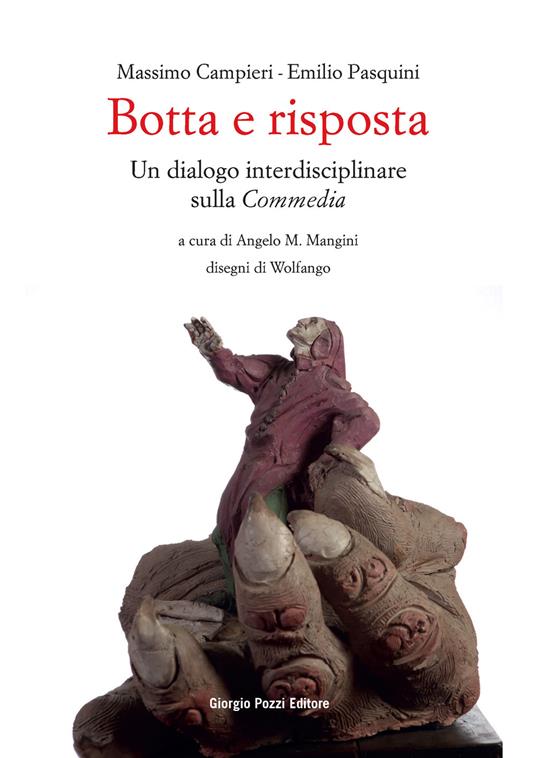“Dante in the Comedy is a precursor of narrative medicine” (p. 39)
Massimo Campieri, physician and professor at the Alma Mater University of Bologna, is the one making this statement in the just published Botta e risposta. Un dialogo interdisciplinare sulla Commedia (Giorgio Pozzi Editore), the sixth title in the “Bollettino dantesco” series. The other protagonist of the dialogue is Emilio Pasquini, a philologist and professor of Italian literature at the same university. Unfortunately, both voices in this conversation died out in the old days, and editing the book was Angelo Maria Mangini, professor of Italian literature at Bologna.
Botta e risposta is a book in which two passionate professionals, teachers and scholars from seemingly distant fields urge each other to reflect on the text of Comedy and come to read Dante’s journey to health/salvation as the prefiguration of an empathic and intersubjective conception of medical art.
It was precisely on the lexical constellation of “salute” (health), salvation and sanitade that Professor Mangini focused in the book presentation, held at the Archiginnasio Library. For Dante, health is that of the soul and the ultimate goal of his otherworldly journey, but this is not separated from sanitade, or the health of the body. In the Christian conception and thus in Dante’s, body and soul are closely interrelated in the perspective of the psycho-physical unity of beatitude.
In addition to this idea of health that combines body and spirit, for salvation, social interactions are crucial, that is that relational and intra-subjective dimension is fundamental in Dante, which therefore anticipates the last element of the triad that today defines health according to the World Health Organization: bio-psycho-social health model.
Botta e risposta is itself Dantean because on every page it celebrates dialogue, listening and the value of encounters. In fact, the book has an epistolary form, consisting of a provocation or invitation from the Dantesque to which the physician responds. The result is a reading of the Comedy through the input of medicine, but also a deep reflection on the latter through the poem’s human and humanistic afflatus. Campieri, under the guidance of his friend Pasquini, brings forth a profound critique of medicine understood only as a technique, which certainly leads to scientific enrichment, at the expense, however, of an inexcusable impoverishment of the human relationship that founds and animates it.
Indeed, Campieri writes:
“I am more than willing to read with you those parts of the Comedy that require medical-scientific explanations, trying to interpret them with the vision of modern medicine, which unfortunately has become, in the collective imagination, only science and technology. The ultimate goal is to cure the patient as best we can with the powerful means we possess today, but it is still a matter of curing a man, with his fears, joys, defeats, not only to cure, but also to care; to cure with means but also to take care; that is why in this work of ours I see the possibility of integrating the strictly scientific vision with the humanistic aspect, a care for man in toto, a very weak parameter in modern medicine!” (p. 23)
Pasquini has dedicated a lifetime to the study of Dante, but even the doctor Campieri was not the first time he resorted to the Comedy to reflect on his discipline. In fact, back in 2015 on the occasion of World Chronic Inflammatory Bowel Disease Day, Campieri had delivered a magisterial lecture in Florence with the unmistakable title ‘Mi ritrovai per una selva oscura che la diritta via era smarrita…’. The lecture proposed the reading of the first canto of the poem as Dante’s path of recovery from an illness with the help of the physician Virgil.
He had then met Pasquini in Bologna the following year during the Giornate dell’Osservanza where Dante was always discussed. According to the book’s prologue on that occasion, “Massimo confessed that he had read a few books by his fellow Dante scholar […] [and] from that moment a friendship between the two colleagues began, in the sign of Dante’s extraordinary prophetic energy and popular modernity” (p. 13).
In short, this two-voice dialogue on Dante, inlaid between the lines by some splendid drawings by Wolfango, traces almost entirely the first two canticles showing still today how the poem can speak and above all make us speak and think.

The story of this book is, also and above all, the story of a fortunate encounter and an extraordinary conversation between two Masters of the Bolognese Alma Mater, between two disciplines (philology and medicine) and two different personalities, both of great moral and cultural stature. A story that unfortunately ended prematurely, before its protagonists could bring it to a close, but which deserved to be entrusted to readers anyway because, in addition to the testimony of the extraordinary humanity of the two interlocutors, it offers us a reading of the Comedy, as a path of therapy and healing, as singular as it is rich in surprising reflections. In cleverly conflating Dante’s text with seemingly far-flung scientific discoveries and conceptions – from mirror neurons to placebos, from psychoanalysis to cell regeneration – the book makes the project of conquering health, outlined in the poem, the foreshadowing of an empathic and intersubjective conception of medical art, and reminds us that, as in the healing relationship and in life, in the Comedy “no one is saved alone.”
